Critical Commentaries and Studies on Plato's Republic (8 vols.)
Digital Logos Edition
This product has been transferred from Community Pricing to Pre-Pub. The actual funding level may be lower than it appears, which could delay production. The amount of funding still needed will be evaluated and updated soon.
Overview
Delve into Plato’s massive model of the ideal state with a variety of resources for a rich study of the Republic. Begin with Jowett and Campbell’s classic Greek text, notes, and essays, and explore Vaughan and Davies’ scholarly English translation. G.H. Wells then summarizes Plato’s argument in each book of the Republic, and Bernard Bosanquet provides a commentary and notes for English readers that follows Vaughan and Davies translation. Rounding out the collection is Bosanquet’s analysis of education in the Republic and R.M. Wenley’s essay on how Plato’s vision can be seen in modern society.
Plato’s Republic is one of the cornerstone works of Western philosophy. His discussions of justice, virtue, education, and the makings of the ideal state have had an indelible influence on all subsequent political theory. This collection of commentaries and studies provides all the tools necessary for a scholarly study of the father of Western Philosophy’s most substantial work.
With the Logos editions, these valuable volumes are enhanced by amazing functionality and features. Scripture and ancient-text citations link directly to English translations and original-language texts, and important terms link to dictionaries, encyclopedias, and a wealth of other resources in your digital library. Perform powerful searches with the Topic Guide to instantly gather relevant biblical texts and resources. Tablet and mobile apps let you take the discussion with you. With Logos Bible Software, the most efficient and comprehensive research tools are in one place, so you get the most out of your study.
Get a complete view of the great philosopher’s thought with the Loeb Classical Library editions of the works of Plato.
Key Features
- Provides the Greek text and English translations of all 10 books of Plato’s Republic
- Includes critical analysis, overviews, and commentary
- Analyzes how the Republic has influenced Western philosophy and society
Product Details
- Title: Critical Commentaries and Studies on Plato’s Republic
- Volumes: 8
- Pages: 3,025
- Resource Type: Literature
- Topic: Classical Greek Literature
Individual Titles
- Plato’s Republic: The Greek Text, Edited, with Notes and Essays, vol. 1 by Lewis Campbell and B. Jowett
- Plato’s Republic: The Greek Text, Edited, with Notes and Essays, vol. 2 by Lewis Campbell and B. Jowett
- Plato’s Republic: The Greek Text, Edited, with Notes and Essays, vol. 3 by Lewis Campbell and B. Jowett
- The Republic of Plato: Translated into English with an Analysis, and Notes by John Llewelyn Davies and David James Vaughan
- The Republic of Plato, Books 1 and 2: With an Introduction, Notes, and the Argument of the Dialogue by G.H. Wells
- A Companion to Plato’s Republic for English Readers: Being a Commentary adapted to Davies and Vaughan’s Translation by Bernard Bosanquet
- The Education of the Young in the Republic of Plato: Translated into English with Notes and Introduction by Bernard Bosanquet
- The Affinity of Plato’s Republic for Modern Thought by R.M. Wenley
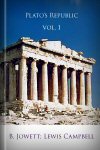
This three-volume work from renowned Greek scholars Benjamin Jowett and Lewis Campbell offers the Greek text of the Republic, expository notes, and analytical essays to Plato’s most substantial work. This first volume, containing Jowett and Campbell’s edition of the entire Greek text, features descriptive headings in English and an index of Greek terms. It is an excellent place to start a scholarly study of this keystone work in the Western canon.
Benjamin Jowett (1817–1893) earned his ThD at the University of Leyden. He was master of Balliol College and regius professor of Greek at the University of Oxford.
Lewis Campbell was an honorary fellow of Balliol College and emeritus professor of Greek at the University of St. Andrews.
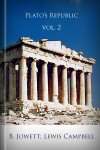
The second volume of Benjamin Jowett and Lewis Campbell’s edition of Republic features analytical essays from the two renowned professors. Essays by Campbell analyze the structure of the Republic compared to Plato’s other works, Plato’s use of language, and the Greek manuscripts. Jowett passed away before his work was finished, and his essays are presented here, unfinished. They cover the Greek texts of Plato, Plato’s conception of evil, and the state and the individual, and veracity. In conjunction with Jowett and Campbell’s Greek text and notes, these essays are an excellent entry point to the scholarly study of Plato and his Republic.
Benjamin Jowett (1817–1893) earned his ThD at the University of Leyden. He was master of Balliol College and regius professor of Greek at the University of Oxford.
Lewis Campbell was an honorary fellow of Balliol College and emeritus professor of Greek at the University of St. Andrews.
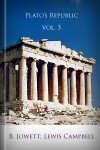
The third piece to Benjamin Jowett and Lewis Campbell’s classic edition of Plato’s Republic, this volume contains notes and commentary on their Greek text. Their notes provide crucial insight into the context of the Republic and analysis of Plato’s language, proving an ideal companion to the Greek text. Together with their Greek text and critical essays, this work is a great place to start a scholarly study of this cornerstone of Western philosophy.
Benjamin Jowett (1817–1893) earned his ThD at the University of Leyden. He was master of Balliol College and regius professor of Greek at the University of Oxford.
Lewis Campbell was an honorary fellow of Balliol College and emeritus professor of Greek at the University of St. Andrews.
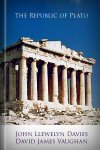
Reprinted dozens of times, John Llewelyn Davies and David James Vaughan’s edition of the Republic features a literal translation style with superb philological precision. This volume also includes Vaughan’s analytical essay on the Republic and John Llewelyn Davies’ introduction and biographical sketch of Plato.
John Llewelyn Davies (1826–1916) was rector of Christ Church, St. Marylebone, and a fellow at Trinity College, Cambridge.
David James Vaughan (1825–1905) was an honorary canon of Peterborough and a fellow at Trinity College, Cambridge.
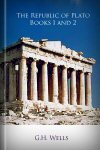
Get the big picture of Plato’s arguments with this volume from Oxford scholar G.H. Wells. Wells provides the Greek text of the first two books of the Republic, along with an introduction and notes to the first two books. He also condenses the argument of all 10 books of the Republic into a few pages each. Wells’ text is a useful reference tool for studying Plato’s massive map of the ideal society.
G.H. Wells earned his MA from St. John’s College, Oxford, and was assistant master of Cranbrook Grammar School.
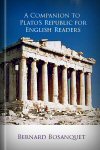
Bernard Bosanquet’s commentary on the Republic provides excellent study notes for the work in English, helping non-Greek speakers appreciate Plato’s language and the context of the massive treatise. Bosanquet’s work is designed to be read alongside Davies and Vaughan’s popular translation. He also includes a brief introduction to fifth-century Greece and Plato, along with helpful notes and hints to approaching the work of Western philosophy’s founder.
Bernard Bosanquet (1848–1923) was a British philosopher, political theorist, and social reformer. He was a fellow at Balliol College, Oxford, but resigned and moved to London to focus on his philosophical research and political and social work. He was a leader of the neo-Hegelian movement in Britain and delivered the Gifford lectures of 1912 and 1913.
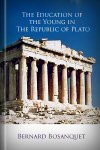
One of the most fascinating and often discussed pieces of Plato’s Republic is his educational propositions. Bernard Bosanquet begins exploring this topic by summarizing classical Greek education during Plato’s time. He then summarizes Plato’s arguments in the Republic and analyzes how education in Greece evolved after Plato. Bosanquet also includes his own translations of books II, III, and IV of the Republic, which deal chiefly with education.
Bernard Bosanquet (1848–1923) was a British philosopher, political theorist, and social reformer. He was a fellow at Balliol College, Oxford, but resigned and moved to London to focus on his philosophical research and political and social work. He was a leader of the neo-Hegelian movement in Britain and delivered the Gifford lectures of 1912 and 1913.
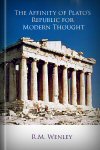
Speaking out of the American west at the beginning of the twentieth century—2,400 years after Plato—R.M. Wenley fleshes out what lessons the Republic still holds for modern society. Wenley’s poetic address analyzes the foundations of public morality and the purpose of philosophy, demonstrating that Plato is still the “immortal protagonist” of the field.
R.M. Wenley was professor of philosophy at the University of Michigan.
About Plato
Plato (427–347 BC) was born in Athens to an aristocratic family. A student of Socrates until the latter’s death, he also studied the works of Heraclitus, Parmenides, and the Pythagoreans. Following the death of Socrates, Plato spent a number of years traveling around the Mediterranean. He eventually returned to Athens and founded a school of philosophy called the Academy (named for the field in which it was located), where he later taught Aristotle.
Plato wrote works on ethics, politics, morality, epistemology, and metaphysics. He is best known for his theory of forms, the theory that the qualities that define a thing’s existence (redness, beauty) exist in an abstract realm of forms, separate from matter. Plato believed that what was true, and therefore real, must be unchanging. Because the material world is in a constant state of change it is not true reality but a mere illusion. Plato taught that love is the longing for the Beautiful in its purest, most abstract, form. Consequently, love is what motivates all the highest human achievements.